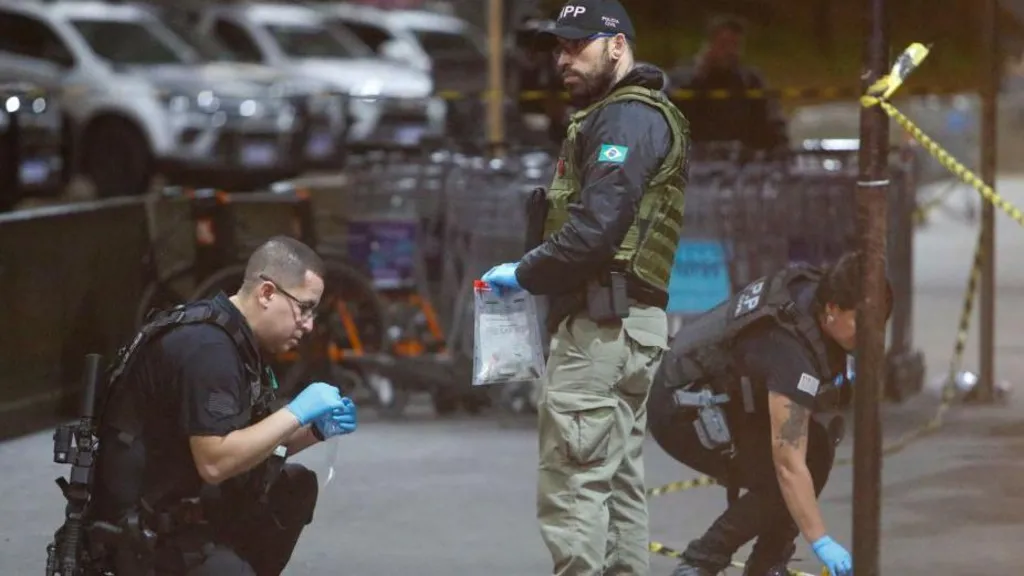
A Brazilian businessman with connections to one of the country’s most notorious criminal groups has been shot dead at São Paulo’s Guarulhos Airport. Antônio Vinicius Gritzbach, a former member of the Primeiro Comando da Capital (PCC)—one of Brazil’s most powerful gangs—was killed in a daylight attack while waiting at the airport.
Gritzbach had recently entered into a plea bargain with local prosecutors, agreeing to provide crucial information about the operations of the PCC in exchange for a reduced sentence. His decision to cooperate with authorities, however, made him a target. According to local reports, he had received death threats from gang members in response to his cooperation.
The Attack
The fatal shooting occurred outside the airport terminal, captured by security cameras. Two men, wearing hoods and carrying submachine guns, emerged from a car and began firing at Gritzbach. The assailants opened fire without hesitation, hitting their target multiple times. Gritzbach, who had been a key player in the PCC, tried to flee but was quickly gunned down at the scene. Three other people were injured during the attack.
Police immediately deployed officers to the airport and the surrounding area following the shooting, but no arrests had been reported as of the latest updates. The attack’s audacity and the use of heavy weaponry suggest the gang’s deep influence and willingness to eliminate anyone who poses a threat to its operations, even those with insider knowledge.
Gritzbach’s Role in the PCC and His Crypto Connections
Gritzbach had a significant role in the criminal network. A cryptocurrency expert, he was allegedly involved in laundering millions of dollars for the PCC, helping the gang hide the proceeds of its illegal activities. His expertise in digital currencies was seen as a valuable asset for the gang’s operations, especially as global financial systems face increasing scrutiny over the use of cryptocurrencies for illicit purposes.
Reports indicate that Gritzbach was once considered a key player in the PCC’s money laundering schemes, leveraging his knowledge of digital finance to cover up the gang’s illicit earnings. As part of his plea agreement, he had promised to provide information to authorities on how the PCC laundered money through cryptocurrency transactions and other methods.
The Plea Deal and Its Risks
Gritzbach’s decision to cooperate with authorities was part of a plea bargain that offered him the possibility of a judicial pardon and a reduced sentence for his role in money laundering. In exchange for his assistance in tracking down other PCC members and providing critical documents, Gritzbach was set to receive a lighter sentence. However, his decision to betray the gang by providing evidence and identifying key members marked him for retaliation.
The PCC, one of Brazil’s most violent and feared gangs, has a long history of seeking revenge on those who turn against it. Gritzbach’s betrayal, combined with his previous ties to the gang, made him a prime target. His death underscores the risks involved for those attempting to cooperate with law enforcement in Brazil, particularly when dealing with powerful criminal organizations like the PCC.
The PCC’s Global Reach
The Primeiro Comando da Capital, or First Capital Command, was founded in the early 1990s and has since grown into one of Brazil’s most notorious and dangerous criminal organizations. The gang is known for its involvement in drug trafficking, extortion, and money laundering. It has a significant presence not only in Brazil but also in other parts of Latin America and beyond.
A recent report from Portuguese security services revealed that the PCC had approximately 1,000 members operating in Lisbon alone, highlighting the gang’s international reach. In fact, a 2023 report by São Paulo’s organised crime task force estimated that the PCC generates nearly $1 billion annually from cocaine trafficking and other illicit activities.
The gang’s activities have spread across the globe, and it remains a major player in international drug trade networks, particularly in Europe. Its presence is felt in major European cities, where its influence continues to grow despite law enforcement efforts to combat its operations.
Conclusion
Gritzbach’s death marks a tragic end for a man who once served as a key figure within one of Brazil’s most dangerous criminal organizations. His decision to cooperate with law enforcement came at a steep price, and his murder serves as a stark reminder of the risks faced by those who attempt to expose the inner workings of the PCC.
The gang’s far-reaching influence, combined with its ruthlessness in eliminating threats, continues to pose a significant challenge to law enforcement both in Brazil and abroad. As global efforts to combat organized crime intensify, the PCC’s ability to operate across borders and use modern technologies like cryptocurrency to launder money underscores the evolving nature of transnational criminal activity.








